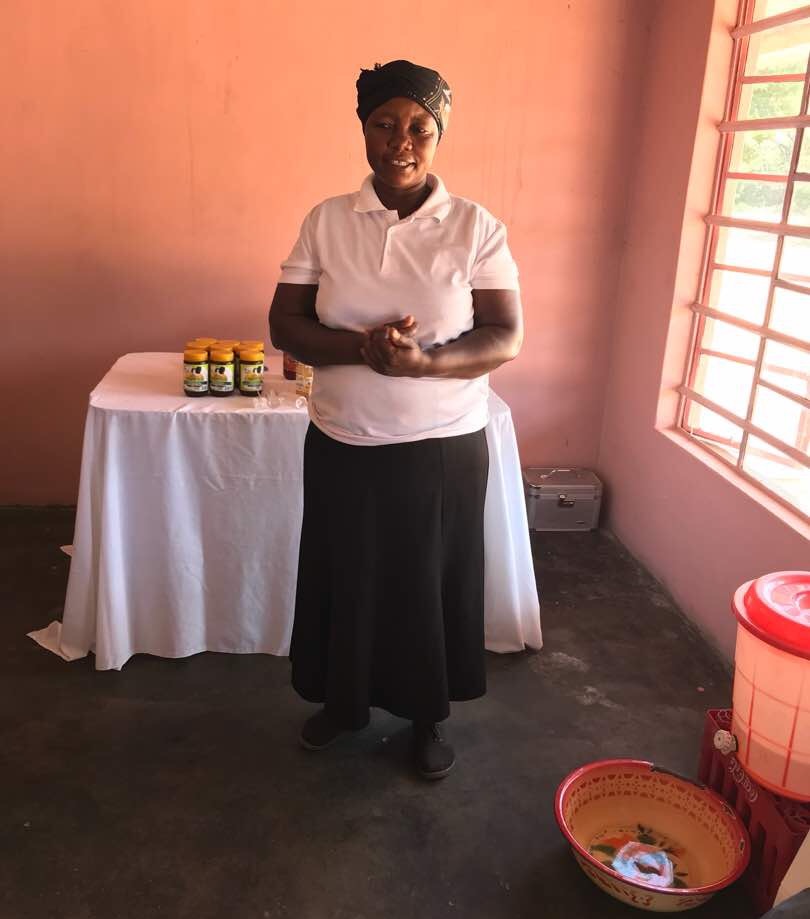Women on the Front Lines of Halting Deforestation

PLUMTREE, Zimbabwe, Jan 29 (IPS) - In Zimbabwe, the bulk of rural communities and urban poor still get their energy supplies from the forests, leading to deforestation and land degradation.
The Zimbabwe Environmental Law Association (ZELA) 2016 review on forest policies in the country found that fuel wood accounted for over 60 percent of the total energy supply, whilst 96 percent of rural communities rely on wood for cooking and heating.
At the same time, livelihoods are shaped by the availability of forest resources, especially in rural areas.
In Mlomwe village, Plumtree, Judith Ncube (54), along with nine other women, derives her livelihood from the marula tree through processing the nuts into oil, butter and skin care ingredients or cosmetic products.
Plumtree is in ecological region 5 in Zimbabwe, one of the areas at risk of desertification if the situation is not curbed. It is among the country's drylands, receiving little rainfall and experiencing periodic drought.
But members of the Vusanani women's group now support their families while in turn helping to protect the forests.
"Our livelihoods as women in this community have improved greatly, and we no longer depend on our husbands for our daily survival," says Ncube, who is the chairperson of the cooperative.
Women are at the forefront of conserving forestry as their husbands have long gone to South Africa seeking greener pastures. Zimbabwe's high unemployment rate forced many to flee the country, leaving women with the double burden of meeting the daily needs of their families. Some husbands don't return, whilst some return after a year or two. Currently, most people are pinning their hopes on the new administration led by President Emerson Mnangagwa, who has promised to revive the economy following the ouster of Robert Mugabe.
Ncube and her team formed Vusanani Cooperative in 2010 through support from various development partners. They now have processing equipment to grind marula nuts into different products.
The Vusanani Cooperative, which process 40 litres of oil every week, buys the raw marula nuts from the Mlomwe community. They buy the kernels at a dollar a cup, with 20 cups producing a litre of oil. They then sell a litre of marula oil for 26 dollars, with marula butter going for a dollar.
The Marula tree is found in hot, dry land areas, an excellent source of supplementary nutrition and provides income for rural people living in this region.
Former Practical Action Officer Reckson Mutengarufu, who is based in the area, said people in the community used to cut down the marula tree to make stools, pestle and pestle stick for use in their homes.
"Things have improved now as villagers can only cut down the marula tree after consulting the village head. We have since trained people on sustainable forest management and the benefits of planting trees in their homes and fields," Mutengarufu said.
Some members have undergone a capacity building training in South Africa through the Forest Forces project sponsored by the Food and Agriculture Organization of the United Nations and Practical Action, an international development charity.
Margaret Ndhlovu (57), a founding member of the group and mother of ten children, managed to travel to South Africa to undergo training under the program. This enabled her to meet and interact with South African farmers in the marula processing trade.
"This was an experience of a lifetime, as I learnt during the trip in South Africa how other female farmers are processing marula fruit into various end products such bicarbonate of soda, okra or marula beer," Ndhlovu told IPS.
The Sustainable Development Goal 15 provides for combating of desertification, reverse of land degradation and biodiversity loss.
Agricultural expansion and tobacco curing, inadequate land use planning, infrastructural development and human settlements in both urban and rural areas, uncontrolled veld fires, illegal gold panning, elephant damage and climate change have all been cited as major factors that impede sustainable forestry management.
According to the United Nations, about 12 million hectares of land are lost globally to desertification every year, with land degradation posing a significant threat to food security.
The United Nations Convention to Combat Desertification, to which Zimbabwe is a signatory, has helped the country's Environmental Management Agency (EMA) work with various stakeholders to address the situation especially in dry regions. EMA is a government body that oversees environmental issues in the country.
David Phiri, the FAO Sub-Regional Coordinator for Southern Africa, told IPS how FAO is implementing other projects such as beekeeping and extraction of oil from trees including the baobab.
"FAO is promoting sustainable harvesting and value addition of non-timber forest products and use of appropriate post-harvest technologies which include metallic silos, improved granaries and hermetically sealed bags so as to minimize losses," Phiri said.
For the women of Vusanani Cooperative, they have long-term plans. By 2020, they want to expand their small marula processing business into a large manufacturing plant. They have since registered a company to enable them to operate as a formal business entity.
© Inter Press Service (2018) — All Rights Reserved. Original source: Inter Press Service
 Global Issues
Global Issues